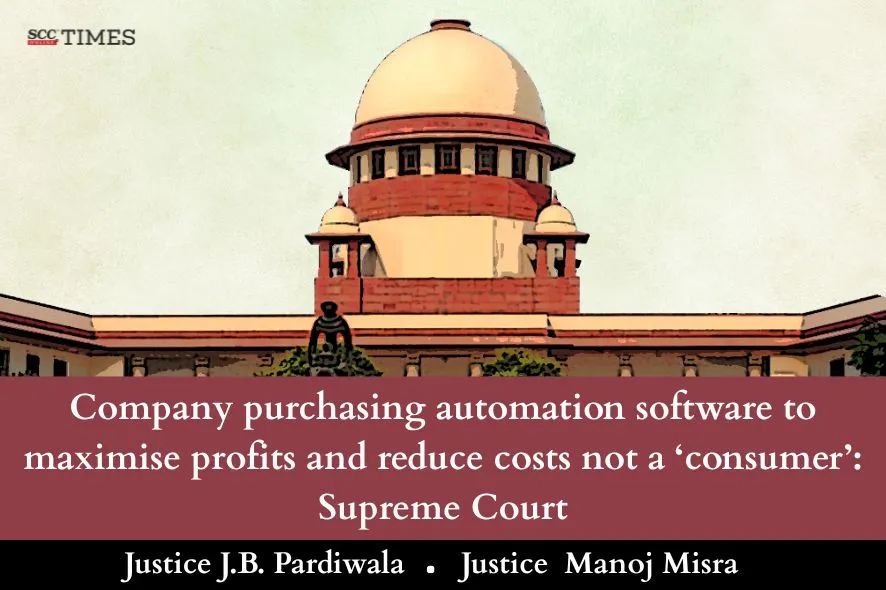Supreme Court: The present appeal was filed by the appellant assailing the order dated 15-6-2020, whereby the order passed by State Consumer Disputes Redressal Commission, Delhi, (‘State Commission’) was affirmed, wherein it was held that the appellant was not a ‘consumer’ as per Section 2(1)(d) of the Consumer Protection Act, 1986 (‘Consumer Protection Act’) was affirmed. The Division Bench of J.B. Pardiwala and Manoj Misra, J.*, stated that the appellant is an established company, which bought the product license to automate its processes. In such circumstances, the object of the purchase was not to generate self-employment but to organize its operations to maximise its profits and reduce costs.
Thus, the Court stated that the transaction of purchase of goods/ services has a nexus with generation of profits and, therefore, the appellant’s transaction cannot be considered a consumer as defined in Section 2(1)(d) of the Consumer Protection Act and accordingly, dismissed the appeal.
Background
The appellant, a company incorporated and registered under the Companies Act, 1956, deals in importing and exporting medical devices. To handle documentation for this, it bought a software called ‘Brillio Opti Suite’ from the respondent and paid for it. However, the software didn’t work properly, so the company filed a complaint with the State Commission.
The appellant in its complaint, claiming deficiency in service, asked for refund of the entire amount paid to the respondent towards (a) product licence cost and (b) additional development cost together with interest at the rate of 18%. The respondent contested the complaint claiming that the complaint was not maintainable as the complainant was not a consumer as defined in Section 2(1)(d) of the Consumer Protection Act. The respondent contested the complaint claiming, inter alia, that the complaint is not maintainable as the complainant is not a consumer as defined in Section 2 (1)(d) of the Consumer Protection Act. Aggrieved by the order of the State Commission, the appellant filed an appeal before National Consumer Disputes Redressal Commission, New Delhi, which was dismissed by the impugned order.
Analysis, Law, and Decision
The Court stated that the identity of the person making the purchase, or the value of the transaction, is not conclusive to determine whether the transaction or activity is for a commercial purpose. What is to be seen is the dominant intention or dominant purpose for the transaction i.e. whether it is to facilitate some kind of profit generation for the purchaser or their beneficiary. If the dominant purpose is for a commercial purpose, then it might have to be considered whether it is for generating livelihood by means of self-employment. However, the same is not required in case of personal use.
The Court further clarified that there is a difference between a self-employed individual and a corporation. The goods purchased by a self-employed individual for generating livelihood would fall within the explanation of the definition of ‘consumer’ under Section 2(1)(d) of Consumer Protection Act, even if activity of that person is to generate profits for its livelihood. However, where a company purchases a software for automating its processes, the object is to maximise profits and, therefore, it would not fall within the Explanation of Section 2(1)(d) of the Consumer Protection Act.
The Court stated that in the present case, the appellant is an established company, which bought the product license to automate its processes. In such circumstances, the object of the purchase was not to generate self-employment but to organize its operations to maximise its profits. Such purchase was eventually linked to generation of profit and inasmuch the automation of business is undertaken, not just for better management of the business but also to reduce costs and maximise profits.
Thus, the Court stated that the transaction of purchase of goods/ services has a nexus with generation of profits and, therefore, the appellant’s transaction cannot be considered a consumer as defined in Section 2(1)(d) of the Consumer Protection Act. The Court stated that the State Commission as well as the National Commission were justified in holding that the goods/services purchased/ availed by the appellant were for a commercial purpose and accordingly, dismissed the appeal.
[Poly Medicure Ltd. v. Brillio Technologies (P) Ltd., 2025 SCC OnLine SC 2443, decided on 13-11-2025]
*Judgment authored by- Justice Manoj Misra
Advocates who appeared in this case:
For the Appellant: Shashank Garg, Sr. Adv.; Divyakant Lahoti, AOR; Kartik Lahoti, Adv.; Praveena Bisht, Adv.; Vindhya Mehra, Adv.; Kumar Vinayakam Gupta, Adv.; Adith Menon, Adv.; Samridhi Bhatt, Adv.; Shreya Gokel, Adv.; Siddharth Tripathi, Adv.; Akanksha Soni, Adv.; Shubheksha Dwivedi, Adv.; Nishtha Jain, Adv.
For the Respondent: Jayant Mehta, Sr. Adv.; Ankur Sangal, Adv.; Sucheta Roy, Adv.; Raghu Vinayak Sinha, Adv.; M/S. Khaitan & Co., AOR



